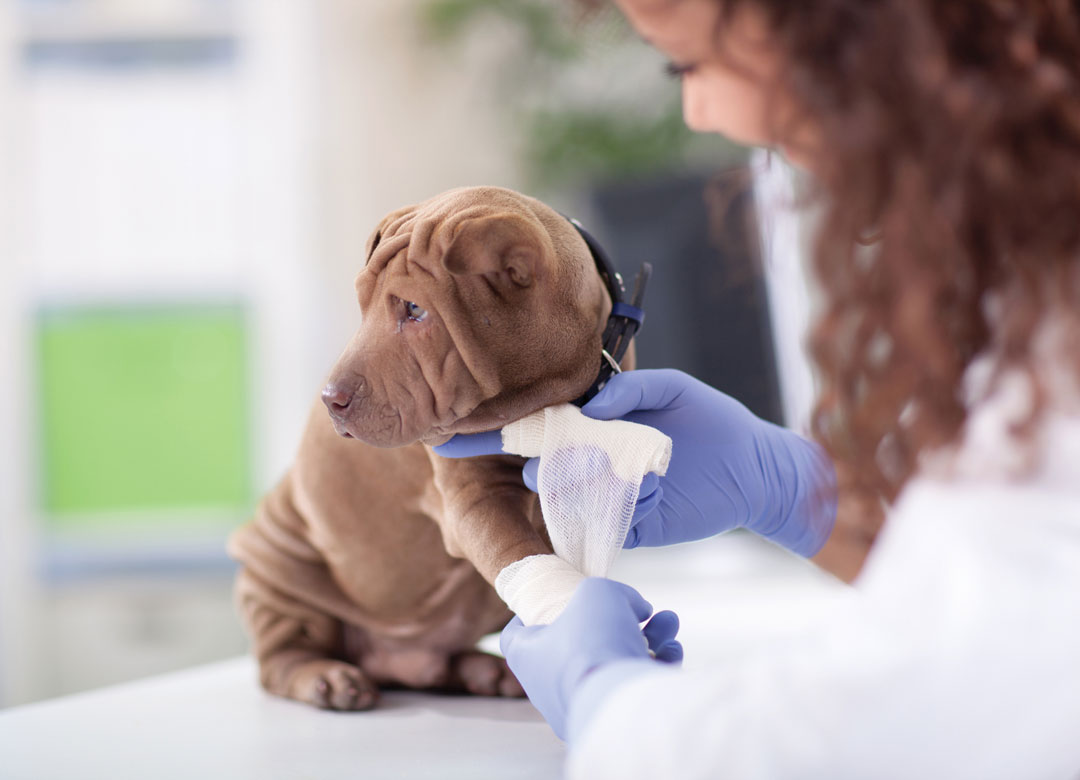How to Know When to Go to the Emergency Vet

When you're a dog owner, it's critical to have a good relationship with a veterinary clinic. Your dog will experience increased quality and quantity of life by regularly visiting a vet for routine exams, preventatives, and lab work.
But there are times in every dog's life when they need to visit a vet because they are sick or hurt, and sometimes, those instances don't occur during regular vets' normal working hours. Many communities have emergency vet clinics that are staffed during the night, on weekends, and during holidays. But it can be more expensive to go to an emergency vet, and people often don't know for sure whether they should go.
Here are some tips for deciding whether your dog needs to see a vet on an emergency basis.
Is There an Open Wound?
If your dog experiences an open wound that's bleeding or appears to be deep, a visit to the emergency vet is a good idea. Wounds left without treatment can get infected quickly, which will mean the necessity of bigger treatments (and bills) later. And wounds that need stitching closed do a lot better if that happens right away, before the body tries to heal the area itself.
Is There an Obvious Broken Bone?
If you can see a bone through the skin or there is an obvious break, with a limb that's looking askew, go to the vet right away. Pain medication and stabilization of the bone are necessary.
Has the Dog Collapsed?
Collapse in a dog is an emergency that could indicate internal bleeding (such as that caused by hemangiosarcoma) or a serious heart or respiratory dysfunction. A dog that collapses, with or without loss of consciousness, needs to see a vet immediately.
Is the Breathing Labored?
Any indication that your dog is having trouble breathing needs to be a trigger for a veterinary visit. Many conditions, including heart failure, can cause labored breathing, and some of them are life-threatening in the short term.
Has There Been Repeated Vomiting or Dry Heaving?
If your dog is vomiting profusely or repeatedly or continuously or recurrently dry heaving, he needs a veterinary exam right away. While there are many life-threatening things that could cause this, GDV is one that is an immediate emergency. Additionally, if the abdomen suddenly seems hard and swollen, with or without vomiting or dry heaving, it is an emergency.
Is There Bleeding from the Nose or Eyes
If a dog is bleeding abnormally, it could indicate a blood clotting disorder such as exposure to rodent poisoning. It may mean there's internal bleeding too, and an emergency veterinarian needs to look at the dog right away.
Has There Been a Seizure?
If your dog has never had a seizure and has one, you should take him to the emergency vet clinic. Seizures can be caused by many things, and some of them can cause death.
If your dog has been diagnosed with epilepsy, whether he's on anti-seizure medications or not, you should take your dog to an emergency vet if he has a seizure that lasts more than five minutes.
Is He Showing Signs of Extreme Pain?
If your dog appears to be in a lot of pain, he needs to go to a veterinarian to get it under control and diagnosed. Signs may include:
- Panting
- Whining and crying
- Restless behavior
- Trembling
You Know Your Dog Best
While the things we've listed above are always an indication that your dog needs to see the vet immediately, there may be other times as well. Ultimately, you know your dog's normal behavior best, so always be on the lookout for indications that something's not right.
Also, you can always call the veterinarian, tell them what you're seeing, and get advice about whether you should come in right away.
You May Also Like These Articles:
Bloat in Dogs: Gastric Dilatation and Volvulus (GDV)
Canine Epilepsy: Seizures in Dogs
Congestive Heart Failure: CHF in Dogs
Disclaimer: This website is not intended to replace professional consultation, diagnosis, or treatment by a licensed veterinarian. If you require any veterinary related advice, contact your veterinarian promptly. Information at DogHealth.com is exclusively of a general reference nature. Do not disregard veterinary advice or delay treatment as a result of accessing information at this site. Just Answer is an external service not affiliated with DogHealth.com.


